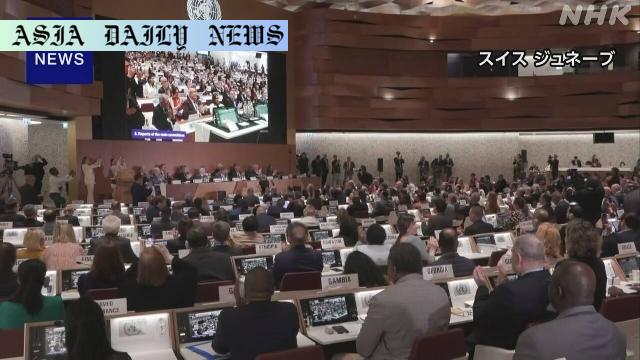Pandemic Agreement: The WHO adopts a treaty to transfer vaccine technology, enhance information sharing on pathogens globally.
WHO members adopt Pandemic Agreement to prepare against future diseases.
Emphasis on vaccine tech sharing and pathogen data exchange.
US, a key financer for WHO, abstains and announces withdrawal.
Treaty to come into effect after ratification by 60 members.

Introduction to the WHO Pandemic Agreement
In an unprecedented display of global cooperation, the World Health Organization (WHO) member states unanimously approved a new Pandemic Agreement during their plenary session in Geneva. This landmark treaty, developed over three years of intense consultations, aims to bolster global capacities to respond effectively to future pandemics. As the world strives to emerge stronger from the lessons learned during the COVID-19 pandemic, this agreement stands as a testament to the importance of science, multilateralism, and shared accountability.
A Framework for Equity in Vaccine and Medicine Access
One of the cornerstones of the Pandemic Agreement lies in knowledge transfer for vaccine production. The treaty emphasizes facilitating the exchange of technology and expertise with developing nations to ensure equitable access to vaccines and medicines. This clause directly addresses one of the major shortcomings of the recent pandemic, where vaccine inequity created significant disparities in global recovery. By prioritizing equitable access, the agreement seeks to curb future health crises from disproportionately affecting vulnerable populations.
Pathogen Data Sharing and Accelerated Response
The agreement also stresses the importance of creating a robust framework for the timely sharing of pathogen data among nations. This initiative would accelerate the production of vaccines and therapeutics during outbreaks, ensuring swift containment and management. Pathogen data exchanges play a critical role in understanding the spread and mutations of infectious diseases, offering the scientific community actionable insights to develop effective countermeasures.
Challenges Posed by the US Withdrawal
Despite the treaty’s historic significance, its effectiveness faces potential roadblocks due to the absence of the United States. The US, the largest financial contributor to the WHO, announced its withdrawal from the organization and abstained from the plenary session. US Health Secretary Robert F. Kennedy Jr. released a video statement on the country’s non-participation, raising concerns about the geopolitical implications of this decision. Experts worry that the US’s withdrawal could undermine global efforts, exacerbating challenges in funding and coordination during future pandemics.
A Global Victory for Science and Collaboration
The Pandemic Agreement has been hailed as a triumph for science and multilateralism. WHO Director-General Tedros Adhanom Ghebreyesus called it a “victory for humanity,” expressing confidence that it would enhance the world’s preparedness against future health threats. Success, however, hinges on ratification by 60 member states, which will give the treaty the legal status necessary to implement its ambitious provisions. As the ratification process unfolds, the international community will watch closely to evaluate the treaty’s transformational potential.
The Road Ahead: Building a Pandemic-Resilient World
The Pandemic Agreement represents a critical step in aligning global health policies with lessons learned from prior pandemics. However, executing the treaty’s objectives will require continued cooperation, investment, and unwavering commitment from member states. By embracing shared responsibility, the world can achieve a more pandemic-resilient future, ensuring that no country or population is left vulnerable in the face of emerging infectious diseases.
Commentary
A Milestone in Global Health Governance
The unanimous adoption of the WHO Pandemic Agreement marks a pivotal moment in global health governance. It demonstrates that nations can unite under a common framework to address existential threats like pandemics. The focus on equitable vaccine distribution and sharing of pathogen data is crucial, as it underscores the importance of treating public health as a shared responsibility rather than a privilege. In the absence of such measures during COVID-19, low-income nations struggled to access life-saving treatments, exacerbating health disparities.
Addressing the Challenge of Non-Participation
However, the absence of the United States from these discussions casts a shadow over the agreement’s long-term viability. As the largest contributor to the WHO, the US plays a significant role in supporting global health initiatives. Its withdrawal sends a discordant message, potentially undermining collective efforts to build pandemic resilience. This highlights the often fragile nature of multilateral commitments, where geopolitical tensions can overshadow the greater good. The situation calls for diplomatic interventions to encourage re-engagement, as the stakes are far too high.
The Ethical Imperative of Global Solidarity
Beyond the technical aspects of the agreement, its ethical implications are equally compelling. Ensuring that life-saving resources are accessible to all, regardless of geography or economic status, reflects a moral obligation to uphold the principles of equity and justice. The Pandemic Agreement offers hope that these values can be enshrined in international health frameworks, fostering trust and cooperation across borders. It is a reminder that humanity’s greatest challenges demand collective, compassionate, and forward-thinking solutions.


